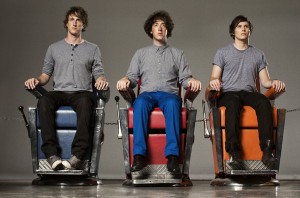The Wombats bring optimism to Los Angeles
This weekend, The Wombats headlined Los Angeles’ 2012 Culture Collide Festival, regaling audiences with their alt-pop stylings and boyish charm.
Though some might not recognize the British group, the band’s unusual name is sure to draw some attention.

Band of bangs · Alt-pop trio The Wombats met at the Liverpool Institute for Performing Arts. Today, they travel across the States spreading a sound that is as influenced by Michael Jackson as it is Foo Fighters. – | Photo courtesy of Independent Label Group
One winter during music school, lead singer Matthew Murphy’s uncle invited him and drummer Dan Haggis on a trip to Australia.
“That’s when we were first introduced to the marsupial wombat,” Murphy explains.
“And it stuck with us,” adds Haggis. “We’ve since held many wombats.”
Bassist Tord Øverland-Knudsen interjects, “It’s also a military term. WOMBAT means ‘Waste of Money, Brains and Time.’ It sums us up very well.”
“Yes,” Murphy says, “but not our music.”
No, The Wombats’ operation is certainly not a WOMBAT, but this trio of Liverpool and Norway natives is decidedly hard to quantify. Friends for years, the band’s members spent their time watching cheesy Sylvester Stallone flicks on the bus, parsing idiomatic expressions like “tidbit” and finishing each other’s sentences.
They met while studying music at the Liverpool Institute for Performing Arts, the university founded by Sir Paul McCartney in 1996.
“We were studying [at LIPA] because we didn’t know what we wanted to do with our lives,” Haggis says. “Apart from that, music was a lot of fun and got us through hangovers.”
The Wombats’ instant chemistry is clearly visible in the band’s live performances. The trio just wrapped a six-week tour as headliners for the Culture Collide festival in Echo Park, where the band’s members regaled audiences with their onstage charisma and tangible camaraderie. For The Wombats, this sense of musical unity results from years of jamming together.
“First time I met Tord was in the practice room,” Haggis says. “We were all kind of doing different things and studying, obviously, so [the band] was on the backburner. … After a couple years, we just started playing shows, loved it and never stopped.”
In their work, The Wombats are the opposite of dogmatic and refrain from self-consciousness. It would be easy to write off their tunes as bouncy “tidbits” but that relies on the assumption that up-tempo tunes are automatically trite, while downbeat ballads are deep and transcendent.
The Wombats establish complexity by juxtaposing danceable tracks with substantial, often harrowingly dark lyrics, resulting in a kind of ecstatic paranoia indicative of a precocious teenager unwilling to grow up. Lyrically, the trio’s curiosity, wit and calculated commentary result in a brand of casual, youthful genius previously achieved by the likes of California’s Pavement or, perhaps more relevantly, East London’s The Libertines.
But their sound is certainly not derivative. Though their music follows in the vein of fellow Brit bands The Fratellis, The Arctic Monkeys and Bloc Party, The Wombats achieve a unique, ever-adapting sound.
“We all listen to such different music and have grown up with lots of different stuff that I don’t think as a band [we would ever try to replicate someone else’s sound],” Haggis says. “I try not to listen to anything really before we go into practice. [My] head’s a bit clearer and [I] can approach things fresh.”
Of course, even the least hardcore punks have always claimed a “year zero” of music, grandly wiping their slate of influences clean. Such musicians play for an idea of the future, with a clear idea of where they’re going and what they’re leaving behind. This is how music evolves, grows — and inevitably, borrows.
Murphy cites influences everywhere from Michael Jackson to The Beatles, Foo Fighters to New Order, although he tries to distance himself from those artists and avoids self-conscious, retrospective analysis of his group’s sound. He asserts that his band’s music developed organically with the defection of its original fourth member. Without a second guitarist, the remaining three had to find a new way to channel that sound.
“Any new songs we were working on we started throwing some more harmonies on and that shaped things from there, organically. We just do whatever we feel we need to at the time, you know, whatever keeps us interested in what we’re doing,” says Haggis.
The Wombats are becoming more and more interesting to audiences in the States.
“We’re kind of a new band still,” says Tord. “We’ve done a few radio festivals on this tour and most people in the front are waiting to see the main band. … You kind of have to win them over, and it’s kind of fun, but weird to start with. You’re just giving and giving and you get nothing back. If you get them to nod their head a bit, then that’s rewarding.”
The Wombats see America as an opportunity and a challenge to focus on the music.
“We obviously like doing, back in the U.K., bigger shows with production and lasers and stuff like that, and over here obviously it’s smaller and more intimate, so we just go back to our punk ethics,” Haggis says.
That’s the always-positive attitude of the touring band. These Internet-age grandsons of British punk seem to be reasserting what The Jam in 1977 called “a young idea” in their song “In The City,” which urges listeners to reject negativity and oppression in favor of embracing freedom, ecstasy and optimism. If you plan, for whatever reason, to throw The Wombats in the bin, take that idea to heart: “You’d better listen man / Because the kids know where it’s at.”
